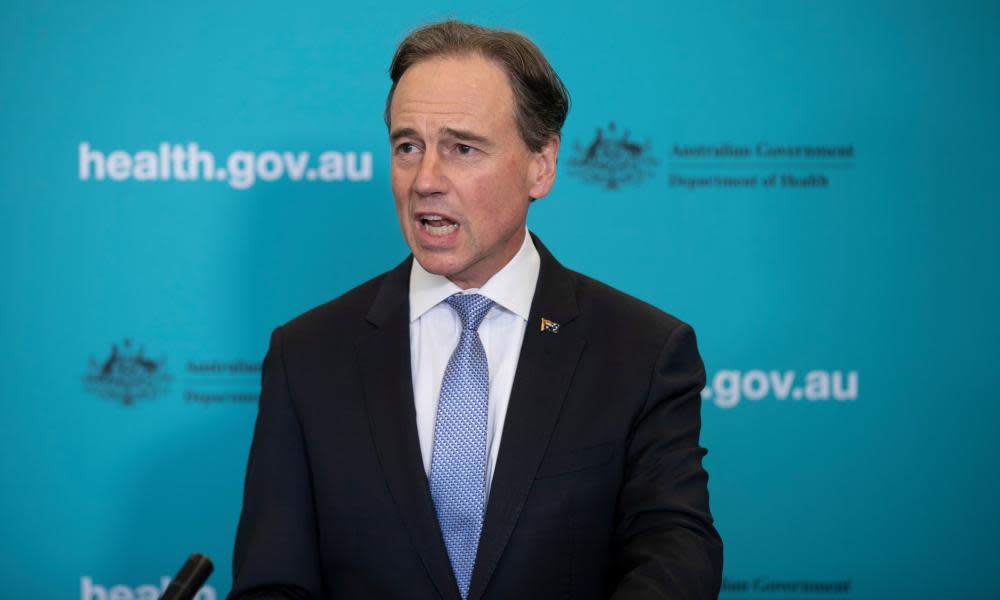Australian children under 12 could be vaccinated this year as minister urges Pfizer to seek approval

Children aged five to 11 could be vaccinated as early as this year after the health minister, Greg Hunt, invited Pfizer to seek Australian approval for use of its vaccine in younger children as soon as possible.
The move to potentially fast-track vaccinations for this age group comes after Pfizer announced it would seek to roll out the vaccine to under-12s in the US, and as the Australian Medical Association called for more children to be vaccinated before restrictions were eased.
On Tuesday, Hunt wrote to the managing director of Pfizer Australia and New Zealand, Anne Harris, inviting the company to also apply to Australia’s Therapeutic Goods Administration in parallel with its process in the US.
Related: Future pandemic modelling in Australia to factor in increased severity of Covid Delta variant
“I am heartened by your advice that trials of the Pfizer vaccine are showing promise in children under the age of 12 years of age,” Hunt said.
“I note the announcement that Pfizer International is now intending to apply for regulatory approval of Pfizer’s Covid-19 vaccine for children aged 5 to 12. I encourage and invite Pfizer to submit a parallel application to the TGA for Australian regulatory approval at the earliest possible time.”
Hunt said that if the TGA found that the vaccine was safe and effective for children under 12 years of age, the government had adequate supplies of vaccine on order and could commence vaccination “as a priority”.
Australia’s chief nursing and midwifery officer, Alison McMillan, said the timing of expanding the rollout to this age group would depend on when Pfizer made the application, which would then need to go through the TGA and Australia’s Technical Advisory Group on Immunisation (Atagi).
“It’s important to understand Australia is ready and prepared for childhood vaccination … and of course, for any boosters that might be required of us into the future,” McMillan said.
“Based on when the application is received, the data is submitted and they can make an assessment – it is possible that we will see that this year,” she said.
Earlier on Tuesday the Australian Medical Association and medical experts told the Covid-19 committee that children aged 12 to 15 should have a chance to be vaccinated before restrictions were eased.
Around Australia, just 14.4% of children aged 12 to 15 have had a first dose and less than 1% were fully vaccinated.
The AMA president, Omar Khorshid, told the hearing those who want to be vaccinated in that age group should be able to “before any substantial opening up so they’re not exposed to risk before they have had the opportunity”.
The epidemiologist Prof Mary-Louise McLaws said Australia should look to the experience of countries like Singapore, where children’s infection rates shot up after easing restrictions, rather than basing its reopening plans on modelling.
Children aged 0 to 19 now make up one-quarter of the Covid caseload in Australia, she said. McLaws blamed the fact Australia “didn’t have enough vaccine” for younger age groups, meaning those aged below 39 were “at the back of the queue”. Eligibility opened up to adults aged under 40 in August and since mid-September for those aged 12-15.
McLaws warned Australia could pass the 70% double dosed target in about 24 days and reopen despite the fact those aged 12 to 39 won’t achieve 70% vaccination rates for another 46 days.
“We need a priority line for 12- to 39-year-olds – they are the ones that will acquire Covid and spread it.”
Prof Raina MacIntyre noted that, although Covid is milder in children compared to adults, “some are hospitalised and some die”.
MacIntyre noted the Doherty Institute modelling projects 276,000 children will be infected with Covid in the six months after reopening at 80% vaccination rates overall, including 2,400 who will require hospitalisation, 200 in ICU and 57 who may die.
However, these figures were based on Doherty’s initial modelling, which has since been updated to 93 ICU admissions and 25 deaths, and is based on there being only “baseline restrictions” in place and partial effectiveness of the testing, tracing, quarantine and isolation (TTIQ) regime.
The National Centre for Immunisation Research and Surveillance director, Prof Kristine Macartney, said that Delta’s transmission rate in schools is “five times higher” than Covid strains in Australia in 2020.
Macartney said that there was “very promising” early take-up of vaccines by the 12-15 age group, and defended Australia’s immunisation strategy to target vulnerable older people first.
Macartney, who is an ex officio member of Atagi, said prioritising older Australians was in line with World Health Organization advice, and Australia was still one of a “minority” of countries that had already made vaccinations available for adolescents.
Email: sign up for our daily morning briefing newsletter
App: download the free app and never miss the biggest stories, or get our weekend edition for a curated selection of the week's best stories
Social: follow us on YouTube, Facebook, Instagram, Twitter or TikTok
Podcast: listen to our daily episodes on Apple Podcasts, Spotify or search "Full Story" in your favourite app
Andrew Steer, the director of immunity research at Murdoch Children’s Research Institute, told the Covid-19 committee that Pfizer’s announcement was “terrific news”, although it was based on clinical trials of 2,500 children, far less than adult trials of up to 34,000.
The former deputy chief medical officer, Nick Coatsworth, told the Covid-19 committee that his message on Australia’s response to Covid was one of “cautious optimism”.
Coatsworth, who is now executive director of medical services at Canberra hospital, said Australia was in a “very different” position in 2021. New South Wales, Victoria and the ACT were managing Covid outbreaks, Australia had “increasing but not yet optimal” vaccination rates” and other Covid treatments were improving.
Coatsworth cited treatments such as antibody drug sotrovimab and improved learning around techniques like “proning” (lying patients on their front).

 Yahoo Movies
Yahoo Movies 
